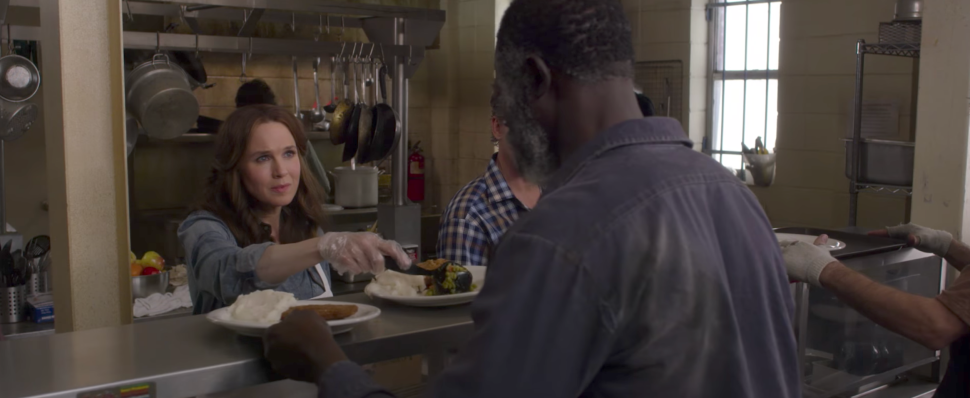
The latest entry in the growing genre of faith-themed movies for the Christian market is the well-meaning, heartfelt, yet clumsily made and not entirely convincing tearjerker Same Kind of Different As Me, about a rich white Texas couple who found God and fought racism by helping the homeless. It’s so sincere and admirable that it seems churlish to voice objections, but the fact remains that it isn’t very good.
|
SAME KIND OF DIFFERENT AS ME ★★ |
Based on a popular autobiographical memoir by Ron Hall with a screenplay by Mr. Hall (with Alexander Foard and Michael Carney) and marking Mr. Carney’s feature debut as a director, a lot of love has obviously been poured into this film. If only good intentions could guarantee box office success, we’d all get magic for Christmas. I have not read the book that provides the subject matter here, but it must have looked better on paper. Ron Hall, an art dealer played by Greg Kinnear, seemed to have it all—a lovely wife, two kids, a thriving business and 15,000 square feet of house considered a work of art—until he cheated on his wife Debbie (Renee Zellweger, who no longer looks anything like Renee Zellweger) and almost threw it all away.
To give their failing marriage another chance, Debbie demanded her unfaithful husband immerse himself in volunteer work at a homeless shelter in the slums. The movie is about how they found love, purpose and a way to save mankind from racism by helping the disenfranchised. Their Good Samaritan focus centers on one particularly violent black thug named Denver Noone (Djimon Hounson) and the consequences of their good deeds. The first time we see him, he’s a filthy social reject, dangerous and hopeless, who bursts into a soup kitchen in a rage with a baseball bat, smashing windows and threatening to kill. Debbie inspires Ron to overcome his fear and to trust in the Lord and show unconditional compassion, and in no time, he’s losing his friends and his reputation in the community by taking Denver to museums, exposing him to Picasso canvases, and bringing him to the all-white country club for lunch. In turn, the black man begins to open up. Flashbacks to his hardscrabble past as a sharecropper in the cotton fields and his eventual incarceration for 10 years in Louisiana’s brutal Angola prison are sketchy at best, but we do watch his grandmother burn to death in a fire and get a furtive glimpse at why he spent his life waging war against the white man. Kindness pays off, the homeless mission grows, lives are changed, and I found it as hard to buy as a Maserati at a tag sale.
All of the stereotypes are here as well as some pretty far-fetched ideas that faith can ease racial tensions, build trust among people divided by social differences, and cure prejudice by holding hands. To the film’s credit, the evangelical preaching and emotional schmaltz are both relatively unobtrusive and kept to minimum moments of discomfort. The problem is the people are just too damn nice to be true and everyone is color blind and overwhelmed by decency in the Fort Worth-Dallas region (played by Mississippi, which looks nothing like Texas)—except Ron’s vicious, alcoholic bigot of a father (Jon Voight, who in real life is an arch conservative). On his death bed, even he sees the light and all is forgiven, but we still have to get through the saintly Debbie’s cancer and Ron’s book about her undying faith to get through. In the long haul, the film is less about faith than it is about charity, and the Halls and their friend Denver raised $85-million to help the homeless before he died in 2012.
The actors try to make flesh out of cardboard. Greg Kinnear does his usual all-American brains and buckwheat routine. Although Renee Zellweger bears no resemblance to the perky blonde who won an Oscar before she discovered plastic surgery (she denies it in interviews but even her head is no longer the same shape) it must be added that whatever she’s done to her face has in no way diminished her appeal as an actress of dimension and skill. Djimon Hounsou is the riveting West African actor who has done memorable work for directors as diverse as Steven Spielberg, Ridley Scott and Jim Sheridan—artists who know how to mine his unusual blend of sensitivity and power. He doesn’t get much help from the inexperienced Michael Carney. His Southern accent seesaws all over the place, and he never really nails the transitions in his complex characterization in a significant way. When first we see him he’s a menacing threat to society with a severe mental illness; by the end, he’s delivering the eulogy at Debbie’s funeral, addressing the white churchgoers and advocating God’s love over Satan for the rich, the poor and everybody between, insisting we’re all the same under the skin. Whenever the film threatens to go off trace, he’s there ford balance. Unfortunately, he is often on his own.
But fear not, even if you’re an atheist. Same Kind of Different as Me is a Christian film in the humanitarian sense, not the religious sense. Its goals are so basic, its tenets so naive, that you want to smile and shake its hand, but I found it next door to impossible to take it as gospel. Cynics might label it a mix of sulphur and molasses, but to me it’s a bucket of too much molasses that badly needs a bigger dose of sulphur.

